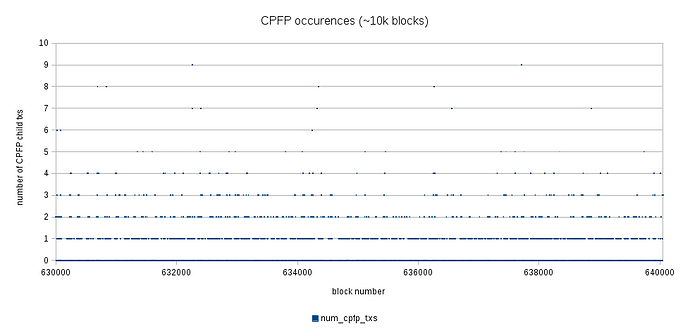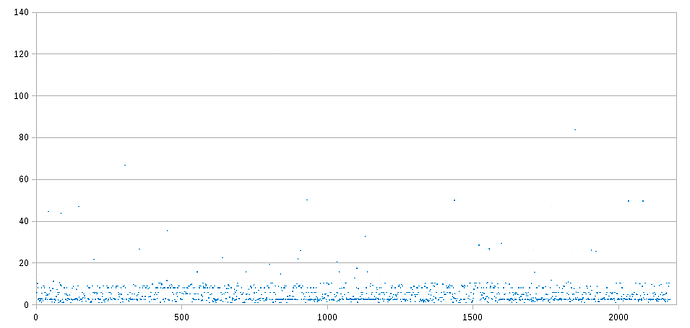For well over a year now we are hearing voices that it is important to increase the chain-depth of unconfirmed transactions accepted by a client. We got a token increase last May, but it doesn’t make much sense for the network to limit what kind of transactions users are allowed to create.
The main issue we hear why deeper chains are not allowed right now is because of the child-pays-for-parent feature. It would make the mining software exponentially more expensive to run. In fact, that is how some clients actually have it running.
So the simple question we need to ask at this stage of the Bitcoin Cash network is if the CPFP feature was enabled prematurely, before the software architecture was able to support it. And by asking that we need to also ask who is using CPFP now.
So, let me present a research app in my new favourite way of digging in the chain using FloweeJS.
The app here:
function getBlock(height) {
// console.log("getBlock called with " + height);
var findPotentials = {
jobs: [{
value: height,
type: Flowee.Job.FetchBlockOfTx,
txFilter: [Flowee.IncludeOffsetInBlock, Flowee.IncludeInputs, Flowee.IncludeTxid]
}]
};
Flowee.search(findPotentials).then(function(findPotentials) {
var hashes = {}; // txids in the block we are looking at
for (tx of findPotentials.transactions) {
if (tx.isCoinbase === false)
hashes[tx.txid] = tx;
// resolveDetails.totalTx++;
}
for (tx of findPotentials.transactions) {
// a CPFP transaction is meant to increase the fee, which it effectively
// does by lowering the 'change' we get back ourselves. It does this
// by adding a new tx which spends the change and splits it into a fee
// and change.
// So, filter to transactions that have 1 input which is created in
// the same block.
if (tx.isCoinbase == false && tx.inputs.length == 1) {
var prev = hashes[tx.inputs[0].previousTxid];
if (typeof prev !== 'undefined') {
// console.log(" potential CPFP tx " + tx.offsetInBlock)
let check = {
jobs: [{
// get more info about our bad boy
type: Flowee.Job.FetchTx,
value: tx.blockHeight,
value2: tx.offsetInBlock,
txFilter: [Flowee.IncludeOffsetInBlock,
Flowee.IncludeOutputAmounts,
Flowee.IncludeInputs,
Flowee.IncludeFullTxData]
},
{ // fetch the one it spends
type: Flowee.Job.FetchTx,
value: tx.blockHeight,
value2: prev.offsetInBlock,
txFilter: [Flowee.IncludeOffsetInBlock,
Flowee.IncludeOutputAmounts,
Flowee.IncludeInputs,
Flowee.IncludeFullTxData]
}],
txs: {},
onTxAdded: function(tx) {
this.txs[tx.txid] = tx;
}
};
// and get the transaction-output-amounts our parent spent.
for (input of prev.inputs) {
check.jobs.push({
type: Flowee.Job.FetchTx,
value: input.previousTxid,
txFilter: [Flowee.IncludeOutputAmounts]
});
}
/*
* The potential Tx now can have its fee calculated and the parent
* tx can have the same done.
* Then we can determine if the child adds fees to the parent or not.
*/
Flowee.search(check).then(function(check) {
var childTx = check.transactions[0];
var parentTx = check.transactions[1];
// a CPFP only has one output.
if (childTx.outputs.length !== 1)
return;
// Looks like someone was experimenting or something.
if (childTx.outputs[0].amount == 0)
return;
let childFeeTot = parentTx.outputs[childTx.inputs[0].outputIndex].amount - childTx.outputs[0].amount;
let childFee = childFeeTot / childTx.fullTxData.length
let parentFeeTot = 0;
for (input of parentTx.inputs) {
let inTx = check.txs[input.previousTxid];
parentFeeTot += inTx.outputs[input.outputIndex].amount;
}
for (output of parentTx.outputs) {
parentFeeTot -= output.amount;
}
let parentFee = parentFeeTot / parentTx.fullTxData.length
let togetherFee = (childFeeTot + parentFeeTot)
/ (parentTx.fullTxData.length + childTx.fullTxData.length);
if (togetherFee - parentFee > 0.5) {
// console.log("CPFP tx: " + height + "]=> " + childTx.txid);
console.log(height + "," + childTx.txid
+ "," + parentFee.toFixed(3) + "," + parentFeeTot
+ "," + parentTx.fullTxData.length
+ "," + childFee.toFixed(3) + "," + childFeeTot
+ "," + childTx.fullTxData.length);
}
// console.log(" ParentFee: " + parentFee.toFixed(3) + ", child: "
// + childFee.toFixed(3) + ", total: " + togetherFee);
})
.catch(function(a) {
console.log(a);
});
}
}
}
getBlock(height + 1);
});
}
var Flowee = require('bindings')('flowee')
Flowee.connect().then(function() {
// the header of the CSV-like output
console.log("block,txid,fee.parent,fee.parent-total,parent.tx.size,fee.child,fee.child-total,child.tx.size");
getBlock(630000);
});
Freetrader went and put the output in a spreadsheet which can be downloaded from here;
https://files.slack.com/files-pri/TU80WRQ0M-F015S12615G/download/20200620_freetrader_cursory_look_at_tomzander_cpfp_data.ods


